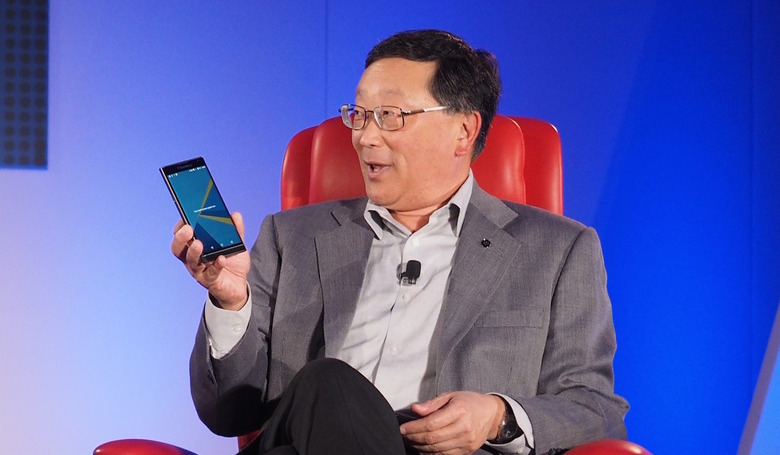BlackBerry CEO Rips Apple's Stance On Privacy And Encryption
BlackBerry, a company whose smartphones most people haven't bought for years, posted an unusual missive on user privacy and security earlier this week penned by CEO John Chen. What's particularly strange about Chen's message is that it seems like he's both slamming and supporting Apple's stance on privacy and encryption.
DON'T MISS: What you need to know before seeing 'Star Wars: The Force Awakens'
Chen starts his post explaining how encrypted apps like WhatsApp and Telegram may have been used by terrorists. He then immediately goes after Apple, without actually naming the company or the iPhone.
"For years, government officials have pleaded to the technology industry for help yet have been met with disdain," he says. "In fact, one of the world's most powerful tech companies recently refused a lawful access request in an investigation of a known drug dealer because doing so would 'substantially tarnish the brand' of the company."
Chen is referring to iPhones that run on iOS 7 or earlier and hence are not fully encrypted. Even if it could open it to law enforcement, Apple decided not to do it, with a judge largely agreeing with the company.
Chen then goes on to suggest that BlackBerry and other companies should do whatever it takes to prevent criminals from abusing the security offered by mobile devices.
"We are indeed in a dark place when companies put their reputations above the greater good," Chen writes. "At BlackBerry, we understand, arguably more than any other large tech company, the importance of our privacy commitment to product success and brand value: privacy and security form the crux of everything we do. However, our privacy commitment does not extend to criminals."
"We reject the notion that tech companies should refuse reasonable, lawful access requests," Chen adds. "Just as individual citizens bear responsibility to help thwart crime when they can safely do so, so do corporations have a responsibility to do what they can, within legal and ethical boundaries, to help law enforcement in its mission to protect us."
Just when you'd think Chen's BlackBerry has figured out a way to allow the government to access data on its devices even when encrypted, the CEO actually fails to explain how BlackBerry would go about doing that.
In fact, Chen quickly changes pace, saying that BlackBerry refused to place backdoors on its devices and arguing that governments shouldn't have any such backdoors that could potentially compromise encryption.
"We also reject any notion of banning or disabling encryption," Chen says. "The hacking epidemic over the past couple years shows that we need more, not fewer, security controls for our sensitive information. Frankly, it is surprising and unnerving that some national political leaders think that an encryption ban could even work on a technical basis."
"We, as a society, have decided that powerful computing devices that manage our identities, photographs, bank statements, and more are better to have than not," the CEO continues. "Users can install applications with encryption that precludes lawful access. If encryption services were banned, criminals would simply write their own encryption apps, resulting in a world where they have better encryption tools than the citizen populace, and our personal privacy would be the only casualty of this debate."
That's generally the same thing Apple, Google, Microsoft and others Internet companies have been saying.
Then Chen suggests that tech businesses and the government should find middle ground.
"It is practical to have public policy that supports law enforcement without impeding personal privacy. Ultimately, users have the right and responsibility to choose privacy with or without the potential for lawful oversight," he says... but it's not clear how BlackBerry would do it.
BlackBerry's full message on encryption is available at the source link.
